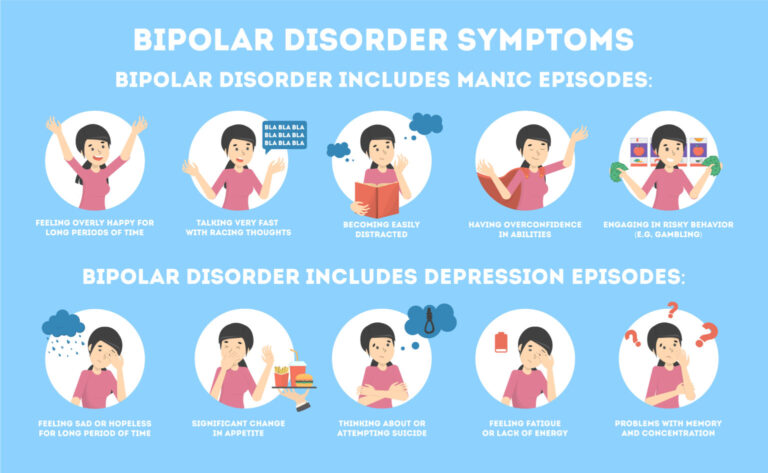
Table of Contents
Schizophrenia is a chronic and severe mental health disorder that affects how a person thinks, feels, and behaves. People with schizophrenia may experience hallucinations, delusions, disorganized speech, and difficulty distinguishing between reality and imagination.
Contrary to common myths, schizophrenia is not “split personality”, but a condition that alters brain function and perception. Around 24 million people worldwide live with schizophrenia (WHO). With proper treatment and support, many lead productive and meaningful lives.
🔎 Causes / Risk Factors
The exact cause is unknown, but schizophrenia develops due to a combination of factors:
- Genetics: Family history of schizophrenia or other psychiatric illnesses increases risk.
- Brain Chemistry & Structure: Imbalances in dopamine and glutamate, along with brain structure differences.
- Prenatal Factors: Malnutrition, viral infections, or complications during pregnancy/birth.
- Trauma & Stress: Childhood abuse, neglect, or highly stressful environments.
- Drug Use: Excessive cannabis, LSD, or other psychoactive drugs can trigger or worsen symptoms.
- Social Isolation: Lack of support or chronic loneliness may worsen risk.
⚠ Common Issues / Symptoms
Symptoms usually begin in late teens to early 30s and fall into three main categories:
🔴 Positive Symptoms (Things “added” to normal experience)
- Hallucinations – Hearing voices, seeing things, or feeling sensations that aren’t real.
- Delusions – Strong false beliefs (e.g., being followed, having special powers).
- Disorganized Thinking & Speech – Jumping between topics, incoherent sentences.
- Abnormal Movements – Repetitive gestures, unusual posture, or agitation.
🔵 Negative Symptoms (Loss of normal functions)
- Reduced emotional expression (flat affect).
- Lack of motivation (avolition).
- Social withdrawal, avoiding interactions.
- Difficulty enjoying daily activities (anhedonia).
⚡ Cognitive Symptoms
- Trouble concentrating or paying attention.
- Poor memory and problem-solving ability.
- Difficulty making decisions.
👉 These symptoms often cause severe social, academic, and work-related challenges.
📊 Table 1: Myths vs Facts
| Myths | Facts |
|---|---|
| Schizophrenia means “split personality” | It is a disorder of thought, perception, and behavior, not multiple personalities |
| People with schizophrenia are violent | Most are not violent; with treatment, they live peacefully |
| It can’t be treated | With medication & therapy, schizophrenia is manageable |
| Only genetics cause schizophrenia | Both genes + environment play roles |
| Patients can’t work or study | Many lead productive lives with support |
📋 Table 2: Do’s and Don’ts
| Do’s ✅ | Don’ts ❌ |
|---|---|
| Seek professional psychiatric help early | Ignore early warning signs (withdrawal, odd behavior) |
| Support with empathy and patience | Stigmatize, label, or isolate the person |
| Ensure regular medication & follow-ups | Stop medicines suddenly without doctor’s advice |
| Encourage healthy lifestyle (sleep, diet, exercise) | Encourage drug/alcohol use |
| Build strong family & community support | Leave the person unsupported or neglected |
🌱 Prevention / Awareness Tips
- Early detection matters – Watch for unusual behavior in late teens/early adulthood.
- Promote mental health awareness – Reduce stigma to encourage treatment.
- Avoid drug abuse – Especially cannabis or hallucinogens in high-risk individuals.
- Supportive environment – Families should provide encouragement, not criticism.
- Consistent treatment – Regular medication prevents relapse.
- Community programs – Rehabilitation centers help with skills, jobs, and independence.
💊 Treatment / Care
While schizophrenia is not curable, it is highly treatable and manageable:
- Medications:
- Antipsychotics (e.g., risperidone, olanzapine, clozapine) are the mainstay.
- They reduce hallucinations, delusions, and thought disorders.
- Psychotherapy:
- Cognitive Behavioral Therapy (CBT) to manage distorted thoughts.
- Social skills training to improve daily functioning.
- Family therapy to support caregivers.
- Rehabilitation & Support:
- Vocational training, supported employment, and housing assistance.
- Peer support groups to reduce isolation.
- Lifestyle Management:
- Regular sleep, stress reduction, and healthy diet.
⚠ Discontinuing treatment often leads to relapse — lifelong management is usually required.
📖 Case Study / Real-Life Example
One inspiring example is John Nash, Nobel Prize-winning mathematician (featured in A Beautiful Mind). Despite battling schizophrenia, he made groundbreaking contributions to economics.
In India, organizations like SCARF (Schizophrenia Research Foundation, Chennai) provide free treatment, rehab, and awareness programs — helping thousands live dignified lives.
❓ FAQs
Q1. Can schizophrenia be cured?
A1. No cure, but it can be effectively managed with treatment.
Q2. Is schizophrenia the same as multiple personality disorder?
A2. No. That’s Dissociative Identity Disorder (DID), a different condition.
Q3. Do people with schizophrenia need lifelong medication?
A3. In most cases, yes. Medicines prevent relapse and manage symptoms.
Q4. Can stress cause schizophrenia?
A4. Stress doesn’t directly cause it, but it can trigger episodes in vulnerable people.
Q5. Can schizophrenia patients marry or work?
A5. Yes. With treatment and support, many lead normal lives, including marriage and careers.
Q6. Is schizophrenia common in children?
A6. Rare, but it can appear in late adolescence or early adulthood.
🏁 Conclusion
Schizophrenia is one of the most misunderstood mental health disorders. While it cannot be cured, it can be managed effectively with treatment, support, and awareness. Stigma is the biggest barrier — not the illness itself.
💡 Remember: People with schizophrenia are not broken — they need understanding, treatment, and hope.


